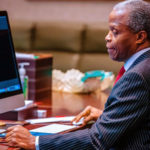Two-point-eight-billion naira oil money is still missing. As I hummed Fela Anikulapo Kuti’s music, ‘Army arrangement’, I reflected on sick politicians, sick followership and a sick nation but we keep moving one day at a time. We won’t die, we have a strong resolve, we don’t die, and we believe that it cannot end just like that. Our immune system defies medical logic.
I recently had a long conversation on the status of Nigeria’s health sector; from infrastructure to personnel, it was a sorry story. Let us not go into the allied industry like pharmaceuticals, medical education or the technology of medicine and others, We tried hard not to focus on misdiagnosis, half-baked and unbaked professionals.
It is not a subject for debate that we do not have the best in terms of health practitioners but we have some of the best that can stand their own anywhere in the world and at anytime. However we are the same country where you hear the stories like this: “The Minister of Health, Dr. Osagie Ehanire has told Nigerian doctors seeking to relocate to countries like the UK to reconsider such plans as they would lose out on getting hazard allowance. Ehanire said there is no need for doctors to leave the country as the government is working on ensuring better welfare for them.”
He was speaking on the 58 doctors who were prevented from leaving Nigeria for the UK recently over visa issues. Ehanire said the news came as a surprise, but noted that the movement was irregular as many of them were without visas.
How did we getting this kind of leaders? Who did we offend? So, the doctors simply went to the airport without visas hoping to travel and they were leaving because of a lack of hazard allowances. What was rocket science in a minister getting the exactitudes in terms of information,.
How is it that doctors are leaving because of hazard allowances, to even risk leaving during this pandemic?
If 58 doctors left in one sweep, and that’s because there were hitches, how many have left unaccounted for, without hitches, and we never will know them, till they do exploits in other climes. Recently, our neighbor, Ghana, was pulling off some local miracle, as her vice president Dr Mahamudu Bawumia, inaugurated a 100-bed Ghana Infectious Disease Centre (GIDC) for treatment and management of COVID-19 and other infectious diseases in the country. The ultra-modern facility worth US$7.5 million was funded by the Ghana COVID-19 Private Sector Fund, which saw 536 patriotic and industrious Ghanaians constructing the project, to support government’s efforts in combating the COVID-19 pandemic.
In Nigeria, we had expended N32 billion to construct tents and medical supplies for the same purpose and spent even more possibly in SMS to Nigerians and daily press briefings, and adashe (cooperative thrift) induced COVID19 fatality figures. Millions of Nigerians are are afflicted, treatable ailments like malaria and others terminal illness like cancer, and then COVID-19 came. The pandemic has disrupted the lives of millions of people. Many have been at home for months. The trauma of the great lockdown is taking a serious psychosocial toll. It’s completely understandable that people want to get on with their lives. But we will not go back to the “old normal.” The pandemic has already changed the way we live our lives. Part of adjusting to the “new normal” is finding ways to live our lives safely.
The growth we are seeing in COVID-19 cases in Africa, nay Nigeria, is placing an ever-greater strain on health services across the continent. There are now about 10,000 confirmed COVID-19 cases amongst healthcare workers in Africa. This has very real consequences for the individuals who work in the healthcare sector.
Doctors, nurses, and other health professionals are our mothers, brothers, and sisters. They are helping to save lives endangered by COVID-19. We must make sure that they have the equipment, skills, and information they need to keep themselves, their patients, and colleagues safe.
Our doctors have threatened strikes, nurses have threatened strikes, the conditions of their work and their concerns about how the governments have been managing the pandemic is one that keeps raising concerns. Even before we got into COVID-19, our health system in Nigeria was already ailing. At the top of the list was the shortage of personnel, nurses and doctors. We went into this pandemic with a skeleton health system. Public healthcare systems had been weakened by ridiculous budgetary allocations
Our population is increasing but not our health infrastructures, Provision of facilities is not keeping pace with population growth. As a nation, a people and government, we have not increased substantially COVID-19 testing for citizens, albeit health workers. We have done little in protecting citizens and health workers by providing high quality PPE and masks, as well as other necessary equipment. Frontline workers are also not being adequately trained to confront the disease.
We have as usual continued to talk, and play politics over increasing the salaries of health workers and paying them on a frequent and regular basis, which can help motivation as we put in more effort in scaling up facilities. We have not even been able to guarantee the inclusion of health workers’ unions on committees that formulate policies for the health sector in general and for the COVID-19 crisis in particular, and that they have a voice in helping to determine such policies.
These are elementary demands, policies that any sensitive person would agree to after having seen the catastrophe inflicted upon the population. Indeed, after Fela sang many years ago, it is 2020, and we are trying to navigate the new normal of COVID-19. What are our leaders doing? NDDC money is missing, NNPC money we don’t know how much is missing, legislators set up inquiry and some people faint, others were more bothered about whether one was a Mushin or VI boy, everything has been scattered; no hospital is built, health workers are shortchanged, citizens are suffering, these are not times to be sick in Nigeria.
Dr Dickson, the team lead at Tattaaunawa Roundtable Initiative, (TRICentre) sent this via pcdbooks@yahoo.com
YOU SHOULD NOT MISS THESE HEADLINES FROM NIGERIAN TRIBUNE
Naira Heads To N500 To Dollar At Parallel Market
FOLLOWING the directive by the Central Bank of Nigeria’s (CBN) to authorized dealers to only open Forms M (a mandatory statutory document to be completed by all importers in Nigeria) for payments in favour of the ultimate supplier of the product or service, with immediate effect, signs have emerged that this will shrink extra source of dollar supply to the parallel market and push the exchange rate to N500/US$…
How The Herbalist Planned My Escape ― Suspected Ibadan Serial Killer
Suspected Ibadan serial killer, Sunday Shodipe, who recently escaped from police custody before he was finally rearrested last Sunday, has narrated how the herbalist with whom he was arrested, Adedokun Yinusa, planned his escape. Shodipe (19), spoke with the Tribune Online shortly after he was paraded by the Oyo State Commissioner of Police, Mr Joe Nwachukwu Enwonwu, at the police command, Eleyele, Ibadan, on Wednesday…
Nigeria’s Q2 GDP Decline Better Than Forecast —Presidency
THE Presidency has said that the 2nd Quarter (Q2) 2020 Gross domestic product (GDP) estimates, which measures economic growth, published by the National Bureau of Statistics (NBS) published on Monday showed that the Nigerian economy performed better than expected…
‘Frequency Of S3xual Intercourse Has Nothing To Do With Enlarged Prostate’
Many men are not aware that with age, they stand a higher chance of developing difficulty urinating. In this interview by Sade Oguntola, a consultant urologist at the University College Hospital, Ibadan. Dr Augustus Takure says prostate enlargement, whose symptoms could include difficulty in urination, is inevitable in all men…






